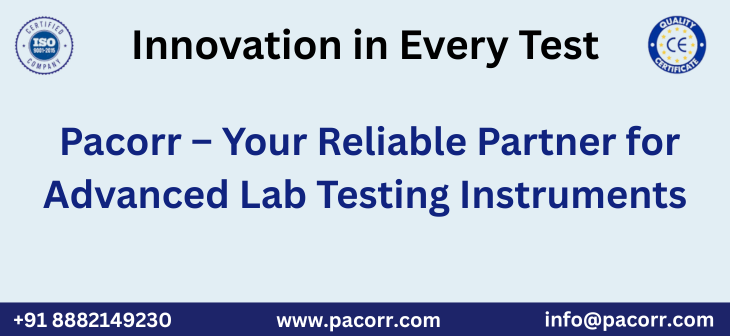
Pacorr is a trusted name in the field of material testing, offering high-precision solutions for a wide range of industries. One of their standout offerings is the Universal Testing Machine, a vital tool designed for testing the tensile strength of plastic materials. As industries continue to rely heavily on plastic for packaging, automotive parts, consumer goods, and more, understanding the mechanical properties of plastic—especially its tensile strength—is crucial. Pacorr’s testing equipment is engineered to deliver accuracy, repeatability, and ease of use, making it a top choice among manufacturers and quality assurance professionals.
Understanding Tensile Strength in Plastics
Tensile strength is one of the most fundamental mechanical properties of plastics. It refers to the maximum amount of tensile stress a material can withstand before failure. For plastic components used in critical applications, such as automotive or aerospace, ensuring that the material meets the required tensile specifications is non-negotiable. This is where Pacorr’s Universal Testing Machine becomes indispensable.
Unlike metals, plastic materials can exhibit a wide range of behaviors under tensile stress due to their molecular structure, composition, and processing history. Measuring tensile strength is not only about breaking the sample; it’s about understanding its elasticity, elongation, modulus of elasticity, and breaking point under controlled conditions.
Why Use a Universal Testing Machine from Pacorr
Pacorr’s Universal Testing Machine is designed with advanced features that make it ideal for testing plastic specimens. Built with a robust framework, digital force sensors, and precision load cells, it provides reliable and repeatable results. The equipment includes high-resolution displacement transducers and software that enables real-time monitoring and data logging.
Using this machine, operators can evaluate plastic samples in various forms—sheets, films, molded parts, and extruded profiles—under tensile loading conditions. The system accommodates both ASTM and ISO standards, ensuring global compliance.
The Complete Process of Testing Tensile Strength of Plastics
Step 1: Sample Preparation
Testing begins with the proper preparation of the plastic specimen. Samples are usually cut into a dumbbell shape, adhering to specifications such as ASTM D638 or ISO 527. The dimensions must be precise, as even slight variations can impact the outcome of the test. Pacorr’s tensile strength tester comes with clamping fixtures that securely hold the specimen in place, avoiding any slippage during the test.
Step 2: Machine Calibration
Before initiating the test, the Universal Testing Machine must be calibrated. Pacorr ensures that each machine is pre-calibrated using certified standards, and users can perform recalibrations as per internal quality norms or regulatory audits. Accurate calibration guarantees consistent results and minimizes measurement uncertainty.
Step 3: Mounting the Specimen
Once the specimen is ready, it is mounted between the machine’s two grips. Pacorr’s machines come with pneumatic or manual grips that provide strong clamping force without damaging the sample. The grips must be aligned correctly to avoid bending stresses that can distort results.
Step 4: Conducting the Test
With the sample in place, the machine begins applying tensile force at a predefined rate. The load cell continuously measures the force being applied, while an extensometer or a digital sensor records the elongation. This phase continues until the plastic specimen fractures.
Pacorr’s Universal Testing Machine logs every data point—stress, strain, time, and displacement—generating a detailed stress-strain curve. The maximum point on this curve indicates the tensile strength of the plastic.
Step 5: Analyzing Results
The real advantage of using a high-quality tensile strength tester from Pacorr lies in the detailed data analysis it offers. Users can review modulus of elasticity, yield strength, ultimate tensile strength, and elongation at break. This data is essential for research and development, quality control, and regulatory submissions.
Pacorr’s software provides customizable reports that include graphs, statistics, and comparisons between batches or materials. These insights help manufacturers make informed decisions about raw materials and processing parameters.
Applications Across Industries
The importance of testing plastic materials for tensile strength extends across various industries. In automotive manufacturing, plastic components need to endure mechanical stress and thermal cycles. In packaging, especially for food and pharmaceuticals, tensile strength determines the durability and protective capabilities of films and containers.
Pacorr’s testing machines cater to all these sectors by offering adaptable and modular setups that fit specific testing needs. Their equipment is built to perform in harsh industrial environments while maintaining lab-grade accuracy.
Key Features of Pacorr’s Tensile Strength Tester for Plastics
- High-precision digital load cells
- Real-time data acquisition and analysis software
- Adjustable grip systems for various sample geometries
- Automatic or manual operation modes
- Compliance with global testing standards like ASTM D638 and ISO 527
- Compact, ergonomic design for easy installation
These features combine to provide a comprehensive testing solution for businesses looking to enhance their material quality assurance programs.
Advantages of Using Pacorr Universal Testing Machine
Choosing Pacorr means opting for reliability, longevity, and technical excellence. Their equipment is backed by years of expertise in material testing and a strong customer support framework. The Universal Testing Machine is engineered to support continuous operations without compromising accuracy.
Furthermore, Pacorr offers user training, regular calibration services, and prompt technical support, ensuring that users extract the maximum value from their investment. Whether for R&D labs or large-scale production facilities, their testing systems are scalable and adaptable.
Pacorr’s commitment to Experience, Expertise, Authoritativeness, and Trustworthiness is evident in their product lifecycle. Every machine is built after rigorous R&D and field testing. Their team comprises material scientists, mechanical engineers, and software developers who collectively ensure each product meets international standards. Customer testimonials and long-term partnerships across industries further highlight their authoritative presence in the testing equipment market.
By focusing on transparent documentation, verified performance metrics, and quality manufacturing, Pacorr continues to build trust with clients worldwide.
Final Thoughts
Tensile testing of plastics is a critical process that affects product quality, safety, and compliance. With Pacorr’s Universal Testing Machine, businesses can achieve consistent and accurate measurement of tensile properties. Whether you're a manufacturer, researcher, or quality control professional, investing in Pacorr’s tensile strength tester equips you with the tools needed for success.
Understanding the tensile behavior of plastics isn't just about meeting technical specs; it's about delivering safer, more reliable products to the market. Pacorr ensures that every test you run is a step toward excellence.
Thanks to Pacorr Testing instruments, we have all the required quality testing instruments that have helped us to ensure the best quality delivered to our clients.

Danish
Fair Exports Pvt. Ltd.
